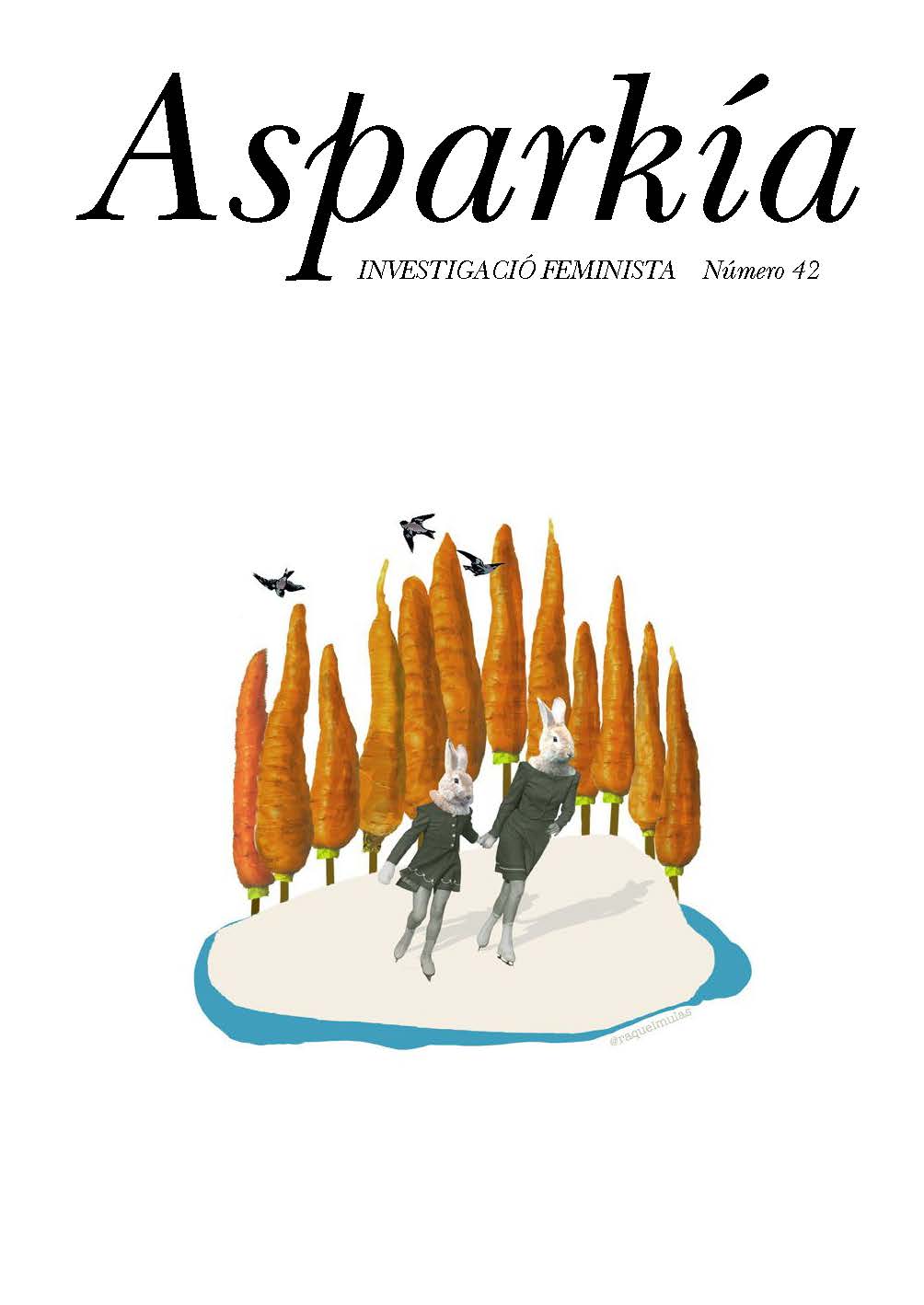AQUÍ Y AHORA. ARTE Y ECOFEMINISMO EN LA ERA DEL ANTROPOCENO. DOS CASOS DE ESTUDIO: STEFANIE HERR Y GABRIELA RIVERA
Contenido principal del artículo
Resumen
Vivimos un presente incierto abocados a un futuro distópico. El COVID-19 sumió a la humanidad en la incertidumbre y la vulnerabilidad resultando las mujeres las más afectadas. La Edad de los Humanos o Antropoceno se revela como la era geológica donde la tierra cambia de forma acelerada por la actividad humana y su capacidad técnica para influir en todos los ecosistemas. En este contexto, sugiere Alicia H. Puleo, debería llamarse a la prudencia (Puleo, 2020), nada más lejos de la realidad. Mientras no se materialice un cambio en nuestro modelo de vida poco compasivo, dominado por la productividad irracional del capitalismo neoliberal, no habrá un presente digno, tampoco un futuro. En este punto, el Ecofeminismo aporta desde la teoría y la praxis alternativas sobre la viabilidad y necesidad de un cambio del modelo vital; un cambio sobre el que trabajan las artivistas Stefanie Herr y Gabriela Rivera.
Descargas
Detalles del artículo
Citas
Barnosky et al. (2012). Approaching a state shift in Earth’s biosphere. Nature, (486), pp. 52–58.
Carbonell, Eudald. (2018). Elogio del futuro. Manifiesto por una conciencia crítica de especie. Taurus.
Chakrabarty, Dipesh. (2009). The Climate of History: Four Theses. Critical Inquiry, 35(2), p. 206.
Fals borda, Orlando. (1980). Revoluciones inconclusas en América Latina. Siglo XXI.
Fao (2020). El estado mundial de la pesca y la acuicultura 2020. La sostenibilidad en acción. Roma. https://doi.org/10.4060/ca9229es
Flys junquera, Carmen. (2015). Aprehender el lugar a través de la literatura. En Raquejo, Tonia y Parreño, José María (eds.), Arte y Ecología (p. 11). UNED.
Gómez gil, Carlos (2022). El Antropoceno y la crisis ecosocial. El País. https://elpais.com/planeta-futuro/red-de-expertos/2022-12-08/el-antropoceno-y-la-crisis-ecosocial.html
Herr, Stephanie. Alcampo. https://www.designboom.com/readers/herrarium-topographic-fine-art-alcampo-by-stefanie-kerr/
Herr, Stephanie. (2016). El Topographic fine art» como denuncia social. Stefanie Herr. https://blog.setdart.com/el-topographic-fine-art-como-denuncia-social-stefanie-herr/
Herr, Stephanie (2017). Stefanie Herr. Setdart, Auction House. https://www.youtube.com/watch?v=j1b9IWZqAPU&t=6s
Herr, Stephanie. FAO77. https://www.stefanieherr.com/portfolio/fao-77
Herr, Stephanie. Happy Hunting Grounds. https://www.stefanieherr.com/portfolio/happy-hunting-grounds
Herr, Stephanie. Alcampo. https://www.stefanieherr.com/portfolio/alcampo
Herr, Stephanie. On Photographic Sculpture: A Conversation with Artist Stefanie Herr. https://www.stefanieherr.com/about-photographic-sculpture
Kristeva, Julia. (1988). El lenguaje, ese desconocido. Editorial Fundamentos, Espiral.
Kristeva, Julia. (1989). Poderes de la Perversión: Ensayo sobre Louis-Ferdinand Céline. Siglo XXI.
Kristeva, Julia. (1978). Semiótica I. Espiral. Editorial Fundamentos.
Latorre romero, Amparo. (2013). De lo abyecto en el cuerpo y sus relaciones con el arte y la semiótica [Tesis doctoral]. Universitat Politècnica de València.
Mandoki, Katia. (2008). Prosaica uno. Estética cotidiana y juegos de la cultura. Siglo XXI Editores.
Mignolo, Walter. (2007). La idea de América Latina. Gedisa.
Mignolo, Walter. (2010). Desprendimiento epistemológico, emancipación, liberación, descolonización. Ediciones el signo.
Moore, Jason. (2016). Anthropocene or Capitalocene? Nature, History, and the Crisis of Capitalism. PM Press/Kairos.
Moore, Jason. (2017). The Capitalocene, Part I: on the nature & origins of our Ecological Crisis. The Journal of Peasant Studies, 44(3), 594-630. DOI 10.1080/03066150.2016.1235036
Ortega, Karen Lorena. (2010): Seres Abyectos. ¿La muerte del ser como sujeto? Cuadernos de Literatura del Caribe e Hispanoamérica, (11), 141.
Puleo, Alicia. (2020). Ecofeminismo en tempos de pandemia. Consello de Cultura Galega. https://www.youtube.com/watch?v=xS7-GFnIUVk
Puleo, Alicia. (2019). Claves ecofeministas: Para rebeldes que aman a la Tierra y a los animales. Plaza y Valdés.
Puleo, Alicia. (2021). Las mujeres y el dualismo naturaleza-cultura. Ciclo de conferencias Filosofía y crisis socioambiental: diálogos interdisciplinarios. Facultad de Filosofía, Universidad de Colima. https://www.youtube.com/watch?v=uRELGwq4qOM
Puleo, Alicia. (2011). Ecofeminismo: para otro mundo posible. Cátedra.
Ramírez, Juan Antonio. (2003). Corpus solus, para un mapa del cuerpo en el arte contemporáneo. Ediciones Siruela.
Raquejo, Tonia y Perales, Verónica (eds.). (2022). Arte Ecosocial. Otras maneras de pensar, hacer y sentir. Plaza y Valdés.
Rivera, Gabriela. (2018). Especial Gabriela Rivera. Ojozurdo. Fotografía y política, (2).
Rivera, Gabriela. (2022). Ponencia en Programa de Doctorado en Estudios Feministas y de Género del Instituto Universitario de Investigaciones Feministas (INSTIFEM) de la Universidad Complutense de Madrid, 17 de noviembre.
Rivera, Gabriela. Proyectos de artes visuales de Gabriela Rivera en http://gabrielarivera.blogspot.com/p/portafolio.html
Rockström, Johan et al. (2009). Planetary Boundaries: Exploring the Safe Operating Space for Humanity. https://pubs.giss.nasa.gov/docs/2009/2009_Rockstrom_ro06010m.pdf
Schökell, Luis Alonso. (2011). La Biblia de nuestro pueblo. Biblia del Peregrino. Ediciones Balterra.
Seif, Sanaa. (2011). Words of Women from the Egyptian Revolution-Sanaa Seif. https://www.youtube.com/watch?v=w8L3FTMyIaU
Shiva, Vandana. (2022). Una década de resistencia. Diez años informando sobre el activismo por la tierra y el medio ambiente alrededor del mundo. Global Witness. https://www.globalwitness.org/en/about-us/
Thunberg, Greta. (2019). United Nations General Assembly Speech. https://www.youtube.com/watch?v=v33ro5lGHQg (Fecha de consulta: 20/11/2022).
Torrano, Andrea. (2020). El bestiario femenino de Gabriela Rivera: monstruas, desechos y restos. Revista latinoamericana de Estudios Críticos Animales, 1, 18-35. https://ri.conicet.gov.ar/bitstream/handle/11336/116892/CONICET_Digital_Nro.93d8fedc-5932-43dc-aa02-de58fbfb9b06_A.pdf?sequence=2&isAllowed=y
Zúñiga, Laura. (2021). Berta Cáceres vive en la lucha de los pueblos por la justicia. El País. https://elpais.com/elpais/2020/03/17/planeta_futuro/1584444343_292548.html


